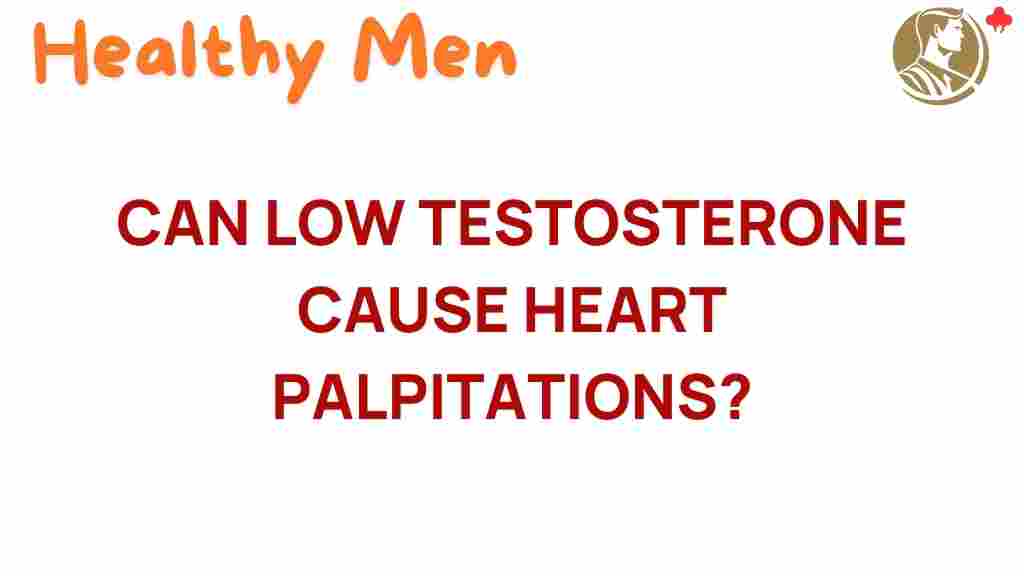The Surprising Link Between Low Testosterone and Heart Palpitations
In recent years, there’s been a growing interest in the relationship between hormonal health and overall wellness, particularly in men’s health. One of the more surprising findings is the connection between low testosterone levels and heart palpitations. This article aims to explore this link, focusing on the impacts of low testosterone on cardiovascular health, the symptoms associated with hormonal imbalance, and what can be done to address these issues.
Understanding Low Testosterone
Testosterone is a vital hormone in the male body, primarily associated with the development of male reproductive tissues, but it also plays critical roles in various bodily functions, including:
- Muscle and bone mass
- Fat distribution
- Red blood cell production
- Mood regulation
Low testosterone, medically termed hypogonadism, can occur for various reasons, including age, medical conditions, or hormonal imbalances. The symptoms of low testosterone can include:
- Fatigue
- Reduced libido
- Depression or mood swings
- Weight gain
- Heart palpitations
The Connection Between Low Testosterone and Heart Palpitations
Heart palpitations are defined as the sensation of having a fast-beating, fluttering, or pounding heart. While they can sometimes be harmless, they can also indicate underlying health issues. Studies have shown that low testosterone can contribute to cardiovascular problems, which may manifest as heart palpitations. Here’s how:
- Hormonal Imbalance: Low testosterone can lead to the imbalance of other hormones, such as cortisol and adrenaline, which can increase heart rate and cause palpitations.
- Blood Pressure Changes: Low testosterone is associated with higher blood pressure, which can stress the heart and lead to palpitations.
- Metabolic Changes: Low testosterone can affect metabolism and increase body fat, leading to conditions like obesity that further strain cardiovascular health.
Symptoms to Watch For
If you are experiencing low testosterone levels, you may notice various symptoms that could impact your quality of life. In addition to heart palpitations, you should be aware of the following:
- Increased fatigue and reduced energy levels
- Difficulty concentrating or memory issues
- Changes in mood, such as increased irritability or sadness
- Decreased muscle mass and strength
- Changes in sleep patterns, such as insomnia or increased sleepiness
How Low Testosterone Affects Cardiovascular Health
The relationship between low testosterone and cardiovascular health is complex. Testosterone influences the vascular system and helps maintain the elasticity and function of blood vessels. Here are some key points:
- Vascular Function: Testosterone promotes the production of nitric oxide, which helps blood vessels relax and improve blood flow.
- Cholesterol Levels: Low testosterone can lead to increased levels of LDL (bad) cholesterol, which is a risk factor for heart disease.
- Inflammation: Low testosterone levels may increase inflammation in the body, which is detrimental to heart health.
Step-by-Step Process to Address Low Testosterone and Heart Palpitations
If you suspect that low testosterone might be contributing to your symptoms, including heart palpitations, it’s essential to take a proactive approach. Here’s a step-by-step guide to addressing these issues:
1. Consult a Healthcare Provider
The first step is to consult with your healthcare provider. They can perform tests to measure your testosterone levels and assess your cardiovascular health. It’s crucial to rule out other potential causes of heart palpitations.
2. Get a Comprehensive Hormonal Assessment
Ask for a comprehensive hormonal assessment. This should include not only testosterone levels but also other hormones that might be affected, such as estrogen, cortisol, and thyroid hormones.
3. Discuss Treatment Options
If low testosterone is confirmed, discuss treatment options with your healthcare provider. Possible treatments include:
- Testosterone Replacement Therapy (TRT): This can help restore testosterone levels and improve symptoms.
- Lifestyle Changes: Exercise, a balanced diet, and weight management can significantly improve testosterone levels and overall wellness.
- Managing Stress: Stress management techniques such as mindfulness, yoga, or therapy can help regulate hormone levels.
4. Monitor Your Symptoms
Keep a journal of your symptoms and any changes you experience after beginning treatment. This will help you and your healthcare provider determine the effectiveness of the chosen approach.
5. Regular Follow-ups
Regular follow-ups with your healthcare provider are essential to monitor your hormone levels and cardiovascular health over time.
Troubleshooting Tips for Managing Symptoms
Here are some tips to help manage symptoms associated with low testosterone and heart palpitations:
- Stay Active: Regular exercise can boost testosterone levels and improve heart health.
- Eat a Healthy Diet: Focus on a balanced diet rich in whole foods, healthy fats, and lean proteins.
- Limit Alcohol and Caffeine: These substances can exacerbate heart palpitations in some individuals.
- Practice Relaxation Techniques: Consider practices such as meditation, deep breathing, or progressive muscle relaxation.
Conclusion
The link between low testosterone and heart palpitations is an important aspect of men’s health that should not be overlooked. Understanding this connection can help men take proactive steps toward improving their hormonal balance and cardiovascular health. If you experience symptoms such as heart palpitations, fatigue, or mood changes, it’s essential to consult with a healthcare provider for a thorough evaluation and appropriate treatment options.
By addressing low testosterone levels and maintaining hormonal balance, men can enhance their overall wellness and reduce the risk of cardiovascular issues. For more information on men’s health and hormonal balance, visit Men’s Health Network and gain insights into managing your health effectively.
Remember, taking charge of your health starts with understanding the signs your body is giving you. Don’t hesitate to seek support and guidance on your journey to better health.
This article is in the category Conditions and created by healthymen Team
